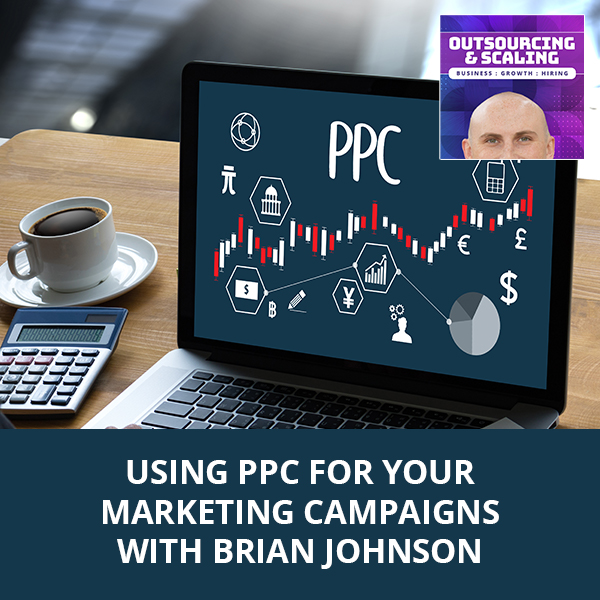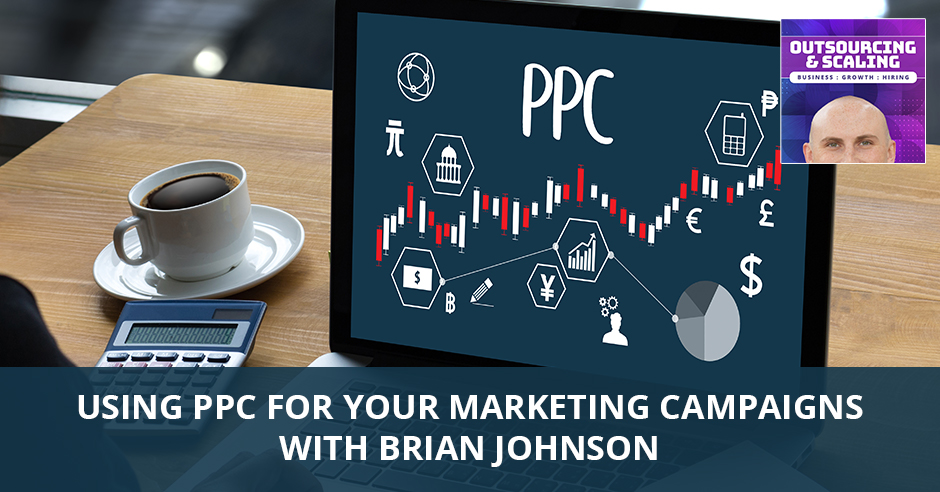


As a driving force in the eCommerce world, Brian Johnson, proves through his works and achievements why he deserves his title. Brian has founded the Amazon PPC Troubleshooting community, Amazon PPC Consulting Association, PPC Scope ad management software, Sponsored Products Academy training course, and Canopy Management. He is truly the PPC authority, and he shares some important bits and pieces about it and why he uses it despite others not wanting to use it anymore. In this episode, learn some common mistakes that people are making when it comes to marketing their products online as well as how you can use PPC for your product marketing campaign.
—
Listen to the podcast here:
[smart_track_player url=”https://www.podetize.com/statsapi/www.podetize.com/wp-content/uploads/fileuploads/11-5b145ef137b51b3d1af0633e9305c43d/09/2019/c263340088af05504e3df50484cbc415.mp3″ title=”Using PPC For Your Marketing Campaigns with Brian Johnson” artist=”Nathan Hirsch” image=”https://freeup.net/wp-content/uploads/2019/04/OAS.png” ]
Download the audio file here.
Using PPC For Your Marketing Campaigns with Brian Johnson
My guest is Brian Johnson. Brian, how are you doing?
Fantastic. I’m glad to be here.
We’re excited to interview you. For those of you that don’t know, Brian is a driving force in the eCommerce world. Not only has he achieved success as an online seller, but he has become the Leading Strategist in Amazon Pay-Per-Click Advertising. Over the course of his career, Brian has founded the Amazon PPC Troubleshooting community, Amazon PPC Consulting Association, PPC Scope ad management software, Sponsored Products Academy training course, and Canopy Management advertising agency for million-dollar brands. We’re going to talk all about that. I’m excited to dive into PPC, but first, let’s take a gigantic step back. What were you like growing up? Were you a rebel? Were you a straight-A student? Did you always know you want to be an entrepreneur? Let me hear that story.
I’d probably been a geek my whole life, honestly. Most of the time, I was not a straight-A student. I’ve always thought of myself to be intelligent and excelled at math and science, but my study habits sucked, my ability to focus on one thing, without squirrels running past me. It wasn’t always great. Twelve to thirteen, I was looking for any side business hustle that I could do. I wasn’t as early as like selling candy to other kids at school. I jumped in my early teenage years and would spend twice as many hours as I was in school working on my own thing. That’s where I developed either my ability or my curse to be a workaholic. It definitely requires more family balance these days in order to torque around that.
Did you graduate college? Did you get a real job after college?
I had a traditional route. I was in retail and wholesale management for probably good ten years then I shifted over to more technical. I worked in Fortune 500 for software development and technical project management and that kind of stuff. I was a hardcore. I was more at the engineering line. I didn’t have an engineering degree. I had an eCommerce degree. I knew back when I was 20 to 21 that that was the path for me, and that’s what I keep on coming back to.
How did you get into Amazon? What year was it? How did that come about?
Automatic campaign is a good starting point for somebody who is a complete novice.
I’ve been selling on eBay for about seven years. I was primarily doing drop shipping for a bunch of different banking equipment brands like Coinsource and money counters and that kind of stuff. The margins sucked in drop shipping. I was probably running maybe 15% margins. I had worked on a couple of other software projects related to the MLM community years ago with some friends of mine, Dave Kettner, and some of his groups. He teaches in the community as well. He had started up with ASM, the Amazing Selling Machine 2. That’s when he pulled me over to the dark side of Amazon. I’m like, “No, I already tested it. It doesn’t work for my product line.” That was my mistake because I had the wrong product for what I was trying to sell on Amazon. I came over during ASM 2 and watched my own products primarily in the kitchen line and showed up happy as can be at the next Amazing Selling Conference. I do recall sitting in the audience with about around 500 to 600 other people. Jason Fladlien gets up on stage and says, “Here’s a wide-open opportunity and she was my competitor.” It was one of those things where I was like, “My first product just got crushed by 40 new competitors within a month after that conference.”
We were talking before and you’re like, “Don’t ask me about warehouse fulfillment. Don’t talk about listing. I want to talk about PPC.” I work with a ton of Amazon sellers and I feel like PPC is one of those things they run away from. They want to do everything besides PPC. Why is PPC something that resonates with you or something that you want to spend your time and focus on?
These days, I sell basically an eclectic line of products that I usually have acquired from other sellers getting out of business. It’s my charity work if you call it. Most of what I started doing initially is I actually got into consulting pretty quick, earlier than I should have, honestly. It was one of those things where there were some off-Amazon brands, like one brand wanted to improve. They were in the beauty category and they had 700 SKUs on Amazon, but they couldn’t get their head around how to promote the right products or how to manage that on Amazon. I started out essentially consulting for them doing everything, customer service and setting up listings and the whole nine yards. One of the areas that I kept on coming back to was like, “How do I promote sales?” Amazon has this advertising platform. This was when keyword match was the only thing available back then. I went in there and started trying to learn it and figure it out. I realized it’s like, “Nobody else has got any training. Nobody’s talking about this. Let me start a Facebook group just so I can start talking with a few other sellers and we could mastermind it, like ten to twenty of us.”
Obviously, that has changed over the years as far as growth but that was the Amazon PPC Troubleshooting group. I kept on getting more and more into it and maybe an analytical engineer type. I got into spreadsheets and figure it out, out of survival, for what I was doing. I started getting to the point where people kept on asking me more questions. It helped me to learn it faster. It constantly challenged me, and it still does, to make sure that I’ve got the latest and greatest information because people are always asking me like, “What about this?” and “What about that?” It started out of survival and has blossomed to a lot more than I would have expected as far as specialization.
Let’s talk about the basics of PPC. If someone is reading who is a seller, maybe they just launched their first product or they’re thinking about launching it, what are the basics that they need to know?
There are a lot of different options. Most people, what they do is look at all the different options and realize like, “There’s a huge learning curve,” and they don’t just start with the basics. The first thing you’re trying to do is figure out how to identify what the audience is. Most sellers go and say, “How do I sell a ton of my product?” That’s the desire but ultimately if you don’t know who your target audience is and the search terms that they’re using to find you, you’ve got no idea how to focus in on that audience any further. Not only with your listing optimization, your pricing or how you are relative to your competitors, let alone your advertising. Starting out with an automatic campaign is a good safe bet for most. There are plenty of checklists as far as how to optimize ads on a weekly basis and it doesn’t require that work anymore, especially with the available software on the market. Start out with automatic campaign. That’s a good starting point for somebody who is a complete novice who is getting started. From there, worry about scaling up to manual campaigns and targeting keyword matches and ad placement, the more intermediate to advanced level things. You don’t need to learn all that starting out. If you’re brand new to the game, start out with the basics, simple automatic campaign. Start with that.
You mentioned understanding your customer and the keywords they’re searching. How much time should you spend gathering that data? Is there a certain amount of time that you recommend or a certain way to go about it before you go all-in with PPC?

PPC definitely feeds into that. You can get a bit information if you’ve got access to brand analytics, but a brand-new seller probably doesn’t have access to brand analytics yet because they don’t have brand registry. The PPC gives more of the insight as far as the specific terms that shoppers are using in order to find your ad in the first place and then purchase your product. As far as getting to know the product, I think most of us, as private label sellers, were more opportunistic as far as the products. We’re not like going, “I’ve had a lifelong passion for this product line. Let me go and introduce it.” That’s rare. Most of the time, we’re like going, “The numbers look good. Let me go and source that. I know nothing about the audience or the product.”
Ultimately, if you are doing your due diligence, in other words you are introducing a product to the market that has some unique aspect that people search for, that’s probably a critical error there, trying to introduce a product that’s like, “It has all these secondary benefits.” You can’t market secondary benefits. You can market primary benefits. You know the product well enough. You don’t have to master exactly who the target audience is. It’s more of a case of, you throw it out there and try to separate it from your competitors, not simply just mirror what all your other competitors are doing, try to separate the product so it stands out a little bit and then look at the advertising. That’s probably the best source of data as far as the mindset of the shopper when they’re looking. The click-through rates and the conversion rates will tell you, “Are you getting in front of the right audience? Does the audience actually want your product?”
Let’s talk about the bigger sellers, let’s say one to five million, maybe even more. We work with a lot of them. We consult with a lot of them. What do you see that’s working and what do you see that’s not working, that’s maybe a common mistake that people are making?
You get into larger scale where you’ve got a lot of SKUs, that can vary. We work with clients that might have half a dozen products that do $500,000 a month. It’s a narrow set of products but they excel well in those areas. You’ve got others that have hundreds of products that they’re constantly trying to market, and they’re generally grouped together. There’s usually a theme of some kind, but a lot of times, what the bigger sellers are doing is a huge amount of testing. Let’s say they’ve got a hundred products that they’re selling. They’re introducing 20, 30, 40 new products just so they can find five they’re going to continue with. They’ve gotten to the point where they can invest in that test, get a smaller batch, would be probably a thousand units of a product, throw it out there and test it with ads and other general promotion. See what sticks and then they focus back in. That’s the key. They test but then they focus back in on what is going to provide the biggest return for them.
You hear a lot of sellers talking about budget or ACoS. What’s your mentality there? Is it the same across the board or are you customizing a plan for every seller?
It’s definitely custom. We’ve got our own proprietary methods when it comes to campaign structure and management, but it works well for us. Budget is secondary. We continue to focus on, first of all, the technical analysis, that would be looking at metrics like the click-through rate and the conversion rate, to tell us how well we’re getting in front of the right audience and then how well we’re converting that audience to a sale. Primarily, you’re going to see that through the sales funnel metrics of the click-through rate and the conversion rate. Beyond that, there’s a lot more contextual analysis that usually is language that is used by the shopper and the audience. That’s where you have to learn what the audience is and what the product is. You can’t simply look at it from a spreadsheet, understand it and manage it well. You have to go beyond that.
Let’s say that you’re a seller and you’re interviewing a PPC expert, a PPC agency, maybe it’s on the FreeUp platform, maybe it’s off, let’s assume that they’re not working with you. What questions would you ask that expert, that guru, that agency, that consultant, to get a better feel of whether they’re the right fit for your account or if they actually understand what they’re doing?
Testing what sells or seeing what sticks is an ideal way for realizing what is going to provide the biggest return.
First of all, they’d have to come to me with a plan that says, “I’ve looked at your account. I understand where the strengths and weaknesses are relative to the market.” It basically tells me what strategies you intend to use in order to hit the goals that I have already stated. I want to increase sales. I want to increase profitability. I’m going to launch new products. Whatever the case is, you should be coming to me and not coming with like, “I’m going to manage your account using best practices.” It’s like, “If you don’t come to me with some plan, even if it’s an outline as far as the strategies, and project where you think it’s where we’re going to win and where we’re going to struggle, then I’m not going to trust that you understand my product well enough in order to hand it off to you.”
Where do you see PPC going? I started selling in Amazon in 2008. PPC wasn’t there. It’s a big part of selling now where it’s tough to be a big seller without maximizing PPC. Where do you think it’s headed?
I think it’s going to get a lot more rich as far as the content. One of things that we certainly see year over year is some of the features that are available through some of Amazon’s higher-end paid platforms, the DSP and the one that used to be called the AMG advertising. Typically, those were more like Amazon’s own in-house agency type of features and tools, being able to run videos, being able to target demographics. Those were all things that aren’t readily available to the average private label seller through Seller Central, but I definitely think that we’ll see a lot more of that.
Typically, AMS is going to be basically the Advertising.amazon.com platform. It’s typically going to be the first beta features and then they’ll roll out to Seller Central over time. There are some features that Amazon has done, like the Sponsored Display Advertising in which they keep on changing the name over time. They’ve been beta testing that for a couple of years and some private label sellers just got it in and they’re going like, “Here’s a brand-new feature.” I was like, “It’s been around.” Amazon is slow on some of those. I definitely see it evolving more into some of the feature sets that we see through like Facebook advertising, YouTube or Google AdWords is the ability to target more demographic information and to have more live content like video.
What would you say to someone that struggled with PPC, or maybe they’ve tried different things, they’ve tried different experts, different best practices over the years, what advice would you have for that?
There could be a number of reasons. It could be a troubleshooting issue that they need to figure out. Is that a product problem versus an advertising problem? I see a lot of sellers that have picked up a suggestion from Course A over here and then Podcast B over here and somebody posted up on Facebook or Reddit some strategy. They’re like pick and choose because they don’t have anything consolidated. Ideally, what I would recommend is that they try to reduce the number of voices that they’re listening to and don’t make it more complicated. Simplify it more. Another is focusing on, “What is it that I need to get out of this? How do I focus the advertising to achieve that?” Most sellers get overwhelmed by it. It’s because they’re trying to do too many things at once and they don’t have the experience or the training in order to do it well.
What are your thoughts on automation versus having an expert actually who manages? Is there a time where you should only use the software? Is there a time where you should only use an expert? Is it always a combination of both?

It’s a combination of both. Definitely, this is an evolving area. It’s got a lot of room for improvement. Certainly, there are plenty of systems out there as far as what they’re calling artificial intelligence. It’s more like a machine learning and automated rules. Even within our own agency or software, it’s like we’ve got automated rules that you can set up in order to automate the basic tasks that you want to do every few days. That benefits. It works fine for the most common technical analysis changes, but where it fails typically is the contextual analysis, that was understanding the flavor of the audience and the products. That’s usually where it falls flat, usually underperforms or overspends. From the standpoint of the technical analysis, software gets you 50% to 60% of the way there. If you are a full brand and you actually have an audience that you know of that you want to target, I think the software is going to let you down.
Let’s talk about the brand. How does your PPC strategy change when you have someone, that has an engaged following, is growing a brand as opposed to someone who just has maybe that few products that they’re selling on Amazon?
More of an established brand is going to have brand recognition. We’re going to have off-Amazon marketing and traffic generation as well. We’ve got clients that sell nationally on retail, brick and mortar, but then they also sell in other platforms, they have advertising outside of Amazon and all these things that you can outsource. The brand recognition typically increases conversion rates for products and so generally the strategy is going to change a bit. We could be a lot more aggressive when it comes to terms that have a higher conversion rate because of their brand, especially when it comes to competitive ads. In other words, our PPC strategy will change to be a lot more aggressive against competitors and against acquiring market share from competitors for branded terms and for brands that have the higher conversion rates because they have a competitive advantage that they can then leverage. Most of those brands, they come in, they haven’t even started using all the different ad types and strategies available that they could be using.
Brian, what did I miss? Any last PPC tips that you want to share with the audience?
The speaking engagements that you have in different conferences and stuff, the message tends to change based off where your heart most compels you. These days I’ve been big on Pareto. In other words, focusing in on, “Where can you spend 20% of your time and effort in order to get 80% of the result.” You don’t need 100%. That additional 80% of work in order to produce 20% additional benefits can give you a competitive advantage, but most sellers, they don’t need that right now. They don’t need it to spend several hours each week doing certain tasks when they’re not any good at it. They should be outsourcing it, or they should be focusing their efforts into, “What’s the 20% of my effort that is going to produce most of the results that I want without overwhelming my time?”
Brian, where can people find out more about you and what are you most excited about for the rest of the year?
My focus is heavily on my agency, the Canopy Management. We’re building a fantastic team here and we’re doing a lot of great things. Second, I would say, Sponsored Products Academy. We actually took a year off, but now we’re bringing back Sponsored Products Academy 3.0 later this year. I haven’t announced when yet, but that will come back later this year. PPC Scope is our software that’s been around for a couple of years. We’ve got a major update that’s coming out, but I would say most of the interaction, most of the community is going to be through the Facebook group, the Amazon PPC Troubleshooting, just because there are 15,000 sellers out there. It’s a good community and all we’re talking about is advertising. It’s a good group to be in.
Check out Brian’s group. Check out his agency. Brian, thank you so much for coming.
It’s a pleasure being here.
Important Links:
- Amazon PPC Troubleshooting
- Amazon PPC Consulting Association
- PPC Scope
- Sponsored Products Academy
- Canopy Management
- Coinsource
- Dave Kettner
- Amazing Selling Machine
- DSP
- Advertising.amazon.com
- Pareto
About Brian Johnson
 Brian johnson is a driving force in the eCommerce world. Not only has he achieved success as an online seller, but he has become the Leading Strategist in Amazon Pay-Per-Click Advertising. Over the course of his career, Brian has founded: the Amazon PPC Troubleshooting community, Amazon PPC Consulting Association, PPC Scope ad management software, Sponsored Products Academy training course, and Canopy Management advertising agency for million-dollar brands.
Brian johnson is a driving force in the eCommerce world. Not only has he achieved success as an online seller, but he has become the Leading Strategist in Amazon Pay-Per-Click Advertising. Over the course of his career, Brian has founded: the Amazon PPC Troubleshooting community, Amazon PPC Consulting Association, PPC Scope ad management software, Sponsored Products Academy training course, and Canopy Management advertising agency for million-dollar brands.
